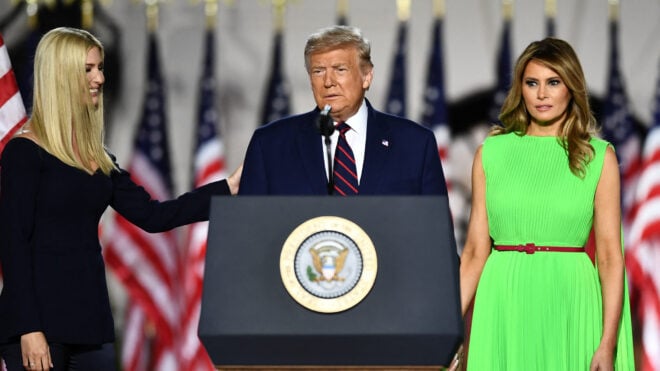Nat Shaffir is a Holocaust survivor. He's also a grandfather, and like many grandparents, he hopes to impart important lessons onto each of his grandchildren. He's 83 this year and is one of the youngest survivors still alive. As such, he's aware of his role now — and the importance of continuing to tell his story.
"I’m their voice. Later on, when we’re gone, these young people will be our voices, and the Holocaust Museum will be our voices. We are actually fighting a war, which means time."
He goes on to add that there is one crucial lesson for them to learn. "In many cases, Hitler succeeded in wiping out total families. He did not succeed with me," he says. "I won, not him."
Nat is a proud grandparent, but as a survivor of such a huge tragedy, he is also a worried one. He knows that to prevent a similar genocide, education is key.
"We don’t have much time. We’re counting on these young people, especially my immediate family, to tell their friends, ‘Here’s what my grandfather did. Hear what happened to him.'"
The second World War came rushing into Nat's life in 1942, when he was only 6. The previous year, thousands of Jews had been killed in Iasi, Romania, the nearest big city. But Nat and his family lived on their remote dairy farm, and up to that point, the war felt very far away.
One day in 1942, a priest, two soldiers, and a police officer came to the farm. The family knew the priest, as they regularly gave him milk for the members of his church who could not buy their own. But no one knew why the other three were there until the priest told the police officer, "These are Jews."
The family knew the police officer, and Nat recalls that his father said, "I’ve known you since you were a little child. I’ve known your parents. Can’t you do something about ‘forgetting’ your order?"
The family was told no, and Nat and everyone else in the home were told they had four hours to pack everything they wanted to take with them and move to the Jewish ghetto in Iasi.
Life at the ghetto in Iasi would barely pass as an experience many of us would recognize. According to Today:
"They were allowed a quarter loaf of bread every two days. To survive, Shaffir’s father traded on the black market. Shaffir always went with him and carried the contraband food; if an adult Jew was caught with black market food, he would certainly be imprisoned and tortured, possibly executed, while a child would just be slapped around a bit, Shaffir said. So it was safer for him to carry the food."
Still, the family lived here for two years until all the men were taken away in 1944. When Nat tried to join his father as he walked to the designated spot, his father said, "Nat, it’s time for you to go back. Nat, take care of the girls."
Nat shares that he never forgot those last five words. "Now, I could have said, ‘OK dad, I’ll try,’ or ‘I’ll do my best.' I never did that. I said, ‘I will.’ I always kept my promise. That stood with me for a long time."
Nat went on to form a friendship of sorts with the Romanian man who was in charge of pumping kerosene for the families. He didn't want to do the job, because it was cold and it took a long time to pump the fuel, so Nat offered to do it instead. In exchange, he got a little more kerosene for his family.
"That kept our family a little bit more comfortable. I was (always) thinking how to make sure my family stays alive."
Nat and his family were liberated from the Iasi ghetto in 1945, when the Russian military arrived. Happily, his father also survived and was able to reunite with his family. They decided to go back to their old farm, and they ran into a friend on the way.
"The farmer was very happy to see us, hugging us. He was happy that my father survived. Then the farmer said, ‘Where are you going from here?’" But then the friend said, "I wouldn't do that."
It turns out the family's farm had been split into three: The priest who had turned them in had one part, the police officer who sent them to the ghetto had a second, and the mayor of the town had the third.
That wasn't all: Nat and his family also learned that everyone in their family except for one uncle had died in the Holocaust.
Nat and his family moved to Israel following the war, and Nat eventually emigrated to the United States. He met his wife, Merryl, and had five children with her. He has stayed active throughout his life, and he even climbed Mount Kilimanjaro when he was 82!
These days, Nat volunteers at the Holocaust Museum, which isn't too far from his home.
It's important to him that he keeps telling his story to his children and grandchildren, so that they will, in turn, tell it to others.
"Without these young people telling what happened, all our lives would have been wasted completely."
His grandson Benji says that he definitely feels compelled to tell other people about what his grandfather experienced. "I feel a special duty to tell my grandfather's story. The truth is that it happened, and we have to learn from it."
Nat also leads tours at the museum, and he makes a point of telling his story in earnest while doing so. The museum's director of survivor affairs, Diane Saltzman, says that survivors like Nat "bring an authenticity and a truth in a way nothing else can. They are the best teachers we have. There will be a huge change when we don't have living eyewitnesses. Having the evidence will be that voice."




